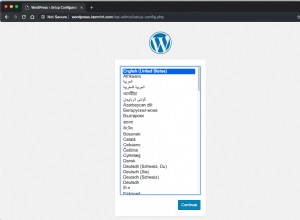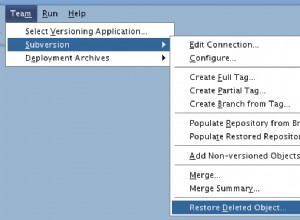Sie richten jeden cURL-Handle auf die gleiche Weise ein und fügen sie dann zu einem curl_multi_ hinzu handhaben. Die zu betrachtenden Funktionen sind curl_multi_* Funktionen hier dokumentiert
. Meiner Erfahrung nach gab es jedoch Probleme beim Versuch, zu viele URLs auf einmal zu laden (obwohl ich meine Notizen dazu im Moment nicht finden kann), also habe ich das letzte Mal curl_mutli_ verwendet , habe ich es so eingerichtet, dass Stapel von 5 URLs gleichzeitig ausgeführt werden.
bearbeiten :Hier ist eine reduzierte Version des Codes, den ich mit curl_multi_ habe :
bearbeiten :Leicht umgeschrieben und viele Kommentare hinzugefügt, die hoffentlich helfen.
// -- create all the individual cURL handles and set their options
$curl_handles = array();
foreach ($urls as $url) {
$curl_handles[$url] = curl_init();
curl_setopt($curl_handles[$url], CURLOPT_URL, $url);
// set other curl options here
}
// -- start going through the cURL handles and running them
$curl_multi_handle = curl_multi_init();
$i = 0; // count where we are in the list so we can break up the runs into smaller blocks
$block = array(); // to accumulate the curl_handles for each group we'll run simultaneously
foreach ($curl_handles as $a_curl_handle) {
$i++; // increment the position-counter
// add the handle to the curl_multi_handle and to our tracking "block"
curl_multi_add_handle($curl_multi_handle, $a_curl_handle);
$block[] = $a_curl_handle;
// -- check to see if we've got a "full block" to run or if we're at the end of out list of handles
if (($i % BLOCK_SIZE == 0) or ($i == count($curl_handles))) {
// -- run the block
$running = NULL;
do {
// track the previous loop's number of handles still running so we can tell if it changes
$running_before = $running;
// run the block or check on the running block and get the number of sites still running in $running
curl_multi_exec($curl_multi_handle, $running);
// if the number of sites still running changed, print out a message with the number of sites that are still running.
if ($running != $running_before) {
echo("Waiting for $running sites to finish...\n");
}
} while ($running > 0);
// -- once the number still running is 0, curl_multi_ is done, so check the results
foreach ($block as $handle) {
// HTTP response code
$code = curl_getinfo($handle, CURLINFO_HTTP_CODE);
// cURL error number
$curl_errno = curl_errno($handle);
// cURL error message
$curl_error = curl_error($handle);
// output if there was an error
if ($curl_error) {
echo(" *** cURL error: ($curl_errno) $curl_error\n");
}
// remove the (used) handle from the curl_multi_handle
curl_multi_remove_handle($curl_multi_handle, $handle);
}
// reset the block to empty, since we've run its curl_handles
$block = array();
}
}
// close the curl_multi_handle once we're done
curl_multi_close($curl_multi_handle);
Da Sie von den URLs nichts zurückbekommen, brauchen Sie wahrscheinlich nicht viel von dem, was da ist, aber so habe ich die Anfragen in Blöcke von BLOCK_SIZE aufgeteilt , wartete, bis jeder Block ausgeführt wurde, bevor er fortfuhr, und fing Fehler von cURL ab.




